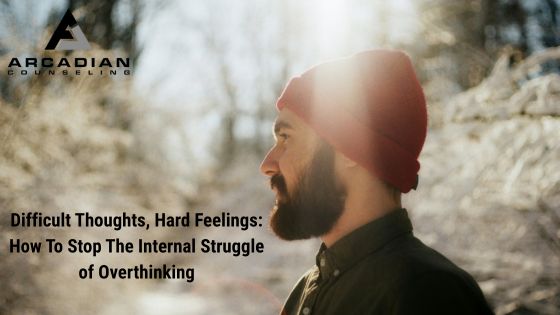If you’re a high-performing guy prone to overthinking, chances are you’ve spent years trying to outwork, outthink, or outrun difficult thoughts and feelings. You might even be pretty good at it. You stay productive, keep things moving, and push through the discomfort—because that’s what you’ve always done.
But here’s the catch: over time, fighting your internal experience stops working. And it wears you down – and being worn down in today’s world with all the demands men face, often leads to destructive habits and a lifestyle not congruent with a rich and meaningful life.
Overthinking: The Inner War We Don’t Talk About
You know those moments when you lie awake at night playing out worst-case scenarios? Or when you feel an undercurrent of unease but push it down with work, alcohol, or the next podcast?
That’s not weakness. That’s being human. Your brain is doing exactly what it was designed to do: detect problems, avoid discomfort, and keep you safe.
The problem is, most of us were never taught how to respond effectively to our internal world – our thoughts, feelings, and sensations. So we do what seems logical: we argue with our thoughts, suppress emotions, and try to control what can’t be controlled.

What ACT Offers Instead
Acceptance and Commitment Therapy (ACT) offers a different approach. Backed by over 900 randomized controlled trials, ACT helps people stop struggling with their inner experience and start building a life based on what actually matters to them.
At its core, ACT teaches us:
The more we try to control or eliminate uncomfortable thoughts and feelings, the more they control us.
ACT doesn’t ask you to “fix” your anxiety or “get rid of” negative thoughts. Instead, it helps you relate to them differently – so they no longer control (and ruin) your life!
3 Key Practices That Shift Everything

1. Cognitive Defusion
You are not your thoughts. ACT teaches you to unhook from your mind’s commentary.
Instead of:
“I’m failing as a dad.”
Try:
“I’m noticing my mind is telling me I’m failing as a dad.”
That subtle shift creates space – and choice.
2. Acceptance
Avoiding discomfort is natural – but it’s also exhausting. ACT helps you make room for uncomfortable feelings without letting them dictate your behavior. It’s not about enjoying pain. It’s about choosing not to resist it at the cost of your own life.
3. Values Clarification
When you stop fighting your inner world, you start asking better questions:
- What kind of partner do I want to be?
- What kind of leader do I respect in myself?
- What would I do if fear wasn’t in charge?
Your values – not your thoughts or feelings – become your guide.

This Isn’t About “Feeling Better”
This isn’t about achieving constant calm. It’s about building the capacity to show up for your life – even when your inner world is loud.
Because what’s even more exhausting than stress…is stressing about the stress. The hiding. The pretending. The internal war.
Real freedom comes when you stop trying to win that unwinnable fight – and start focusing on what you actually care about.
Ready to Work Through It—Not Around It?
Many of the high-functioning men I work with are carrying a heavy mental load. They’re successful on the outside but struggling silently on the inside. The good news? There’s another way.
If you’re ready to stop white-knuckling your way through hard thoughts and feelings – and start building a life based on clarity, purpose, and self-trust then reach out today!
James Killian, LPC is the owner of Arcadian Counseling, a private practice in Greater New Haven, CT, specializing in helping over-thinkers, high achievers, and perfectionists reduce stress, increase fulfillment, and enhance performance — so they can move From Surviving to Thriving. He primarily works with professional men navigating high-pressure careers and meaningful life transitions. His approach blends psychological insight with real-world experience to support men in reclaiming clarity, strength, and purpose.

